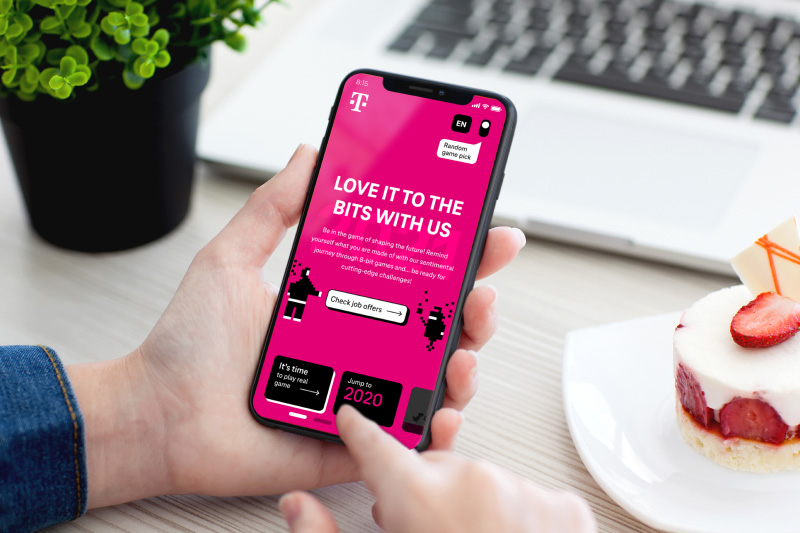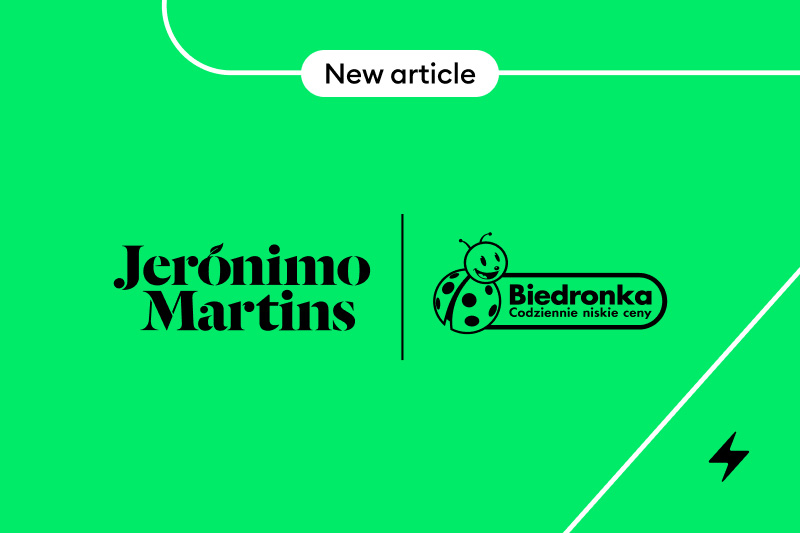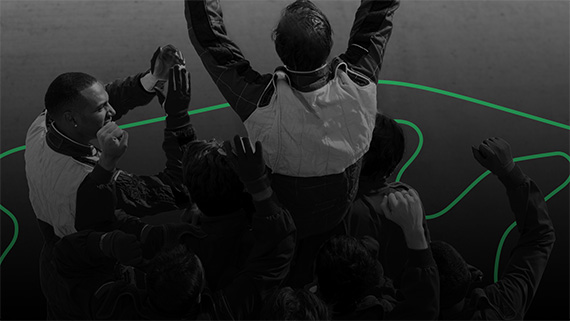About the next release of EB campaign “Love IT to bits” for Deutsche Telekom, through the eyes of a copywriter.
Let me begin a bit unusually – we, as copywriters, people dealing with words, often like to see a bigger picture of our actions. When we created the “Love IT to bits” platform, we intuitively felt that it had enormous potential, but… at the time we didn’t yet know how soon we would find out.
In the meantime, our client, Deutsche Telekom, came back to us with a task that turned out to be nothing less than a joyful leap over the bar we had set for ourselves – reusing the online gaming theme for branding and recruitment purposes. The company developed a new, bold EVP (Employee Value Proposition) as part of its employer branding strategy and asked us to create another edition of the platform, this time in a 16-bit style. So, one can make a pun here by saying that the bigger picture has also become sharper…
While the previous assignment – the pioneering creation of a campaign about Deutsche Telekom’s IT department – read it here seemed fairly straightforward in terms of storytelling [d’uh], this time things slightly differed. An important aspect of the new iteration was to educate the candidates [but also the company’s employees] about how Deutsche Telekom combats the stereotypes and schemes that prevent us from reaching our professional goals. To put it in a nutshell: we were supposed to turn something very un-cool into something cool enough that others would want to hear about it. Oh, sorry, click on it.
Was it easy? Another question from the audience, please.
Educational and image campaigns in the field of DEI [diversity, equity and inclusion] are a slippery slope, especially for copywriters, because on the one hand, it is difficult not to fall into a somewhat exalted and declarative tone and on the other – it is impossible to pretend that we do not face various stereotypes on a daily basis. And even if we are lucky enough to work in an environment free of toxic behavior, various simplifications and schemes stick firmly in our minds. Not to mention that the well-known “imposter syndrome”, especially among women, can effectively hinder the path to promotion and professional fulfillment.
And all looks good, we feel that the topic generally resonates with the audience [both male and female], but how to tell the story using the language of games?
First of all, to be able to create something about breaking the mold , one has to get out of thinking traps and “can’tdoits”, and then say goodbye to all of it without looking back.
Once again, it turned out that teamwork, brainstorming, thorough research and above all, a brainy, idea-inspired client are the best basis for the next steps. It was not only me exceeding the possibilities of my gaming imagination once again, but our developers were also looking for fresh solutions to turn the storytelling vision into a reality.
If someone were to ask me how this “storytelling vision” was created… Imagine a deep off-screen voice, straight out of movie trailers, saying: “One day, it all began with Disconnectors – little, mean, and very spiteful creatures that poisoned the minds of others and stood on a path to desired goals. Over time, Disconnectors were getting stronger, and it seemed like they would take over the entire world without facing consequeces. Luckily, there was someone who stood up to them.
Believe it or not, Disconnectors popped into my head on their own, at the junction of a white sheet of paper and a pen casually brushing across it. As a logical mix of the word “connect” – which is the basis related to Deutsche Telekom’s profile – and disconnecting, which is what stereotypes actually do. Because it’s the stereotypes that isolate us from the group, from our dreams and plans. They are the ones who shatter order and stand in the way of unfettered creativity.
So, who should bravely face them? Since the spotlight in the previous edition of the campaign was on an Mr 8bit character, in the edition dedicated to stereotypes, we just had to bring Miss 16bit to life.
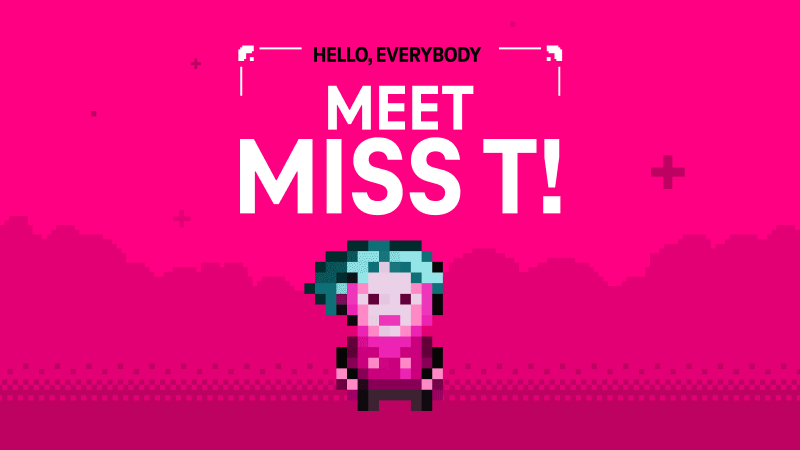
And that’s how the micro-universe of Deutsche Telekom’s new campaign came to be, spread between the protagonist [Miss 16bit] and the antagonists [Disconnectors], in the eternal struggle between good and evil, but… no worries. Although the theme of fighting the stereotypes could easily have turned into mawkish territory full of pathos, we took care to navigate the topic properly. The three games we created – “BraveWave”, “Path Cleaner” and “GrowthScraper” – allude in their plot patterns to the various pillars of EVP, where we put everything through a light, pixelated, magenta-turquoise gaming filter.
Each of these games teaches something but, in a performative, tool-oriented way. BraveWave is nothing else than eliminating Disconnectors with a magenta wave. PathCleaner is a tile-based, oddly satisfying game where you clean the board of Disconnectors by putting them together in groups. And GrowthScraper is a dynamic game where you must dodge our villains and be ambitious to keep going forward.
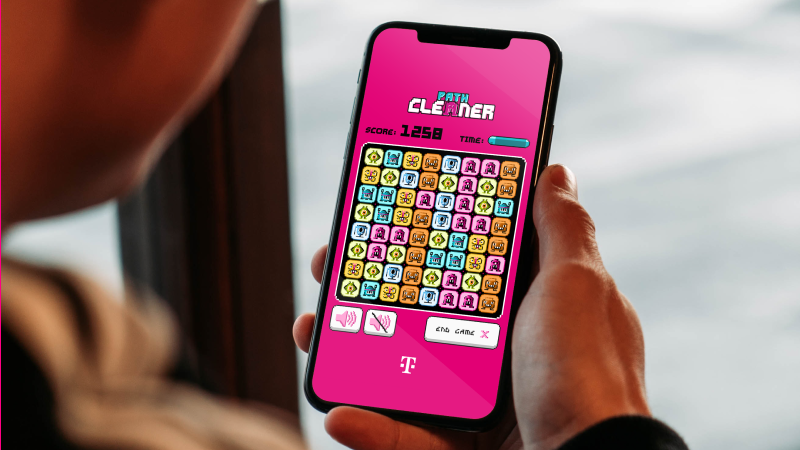
We, as copywriters, like it when our actions have a bigger picture. When ideas fall into a long-term strategy, exploring various fields and aspects of clients’ narratives. And even though this article is very much about me, in the bigger picture, it shows an environment in which we created the “Love IT to bits” project.
An environment in which, despite my lack of gaming experience, I had trust regarding the creative part [and the active players on the team did not brush off my questions with ironic smirks]. An environment where everyone is a protagonist and plays for the same goal - seeking solutions and having everyone’s best interest at heart.
Finally, an environment where the client not only makes specific demands but also actively participates, enjoys every call, and catches the vibe of the idea with enthusiasm.
Having such a great sense of creative safety, I was ready to be brave and face my own Disconnectors but… they didn’t show up. Not even for a moment. They didn’t dare.

